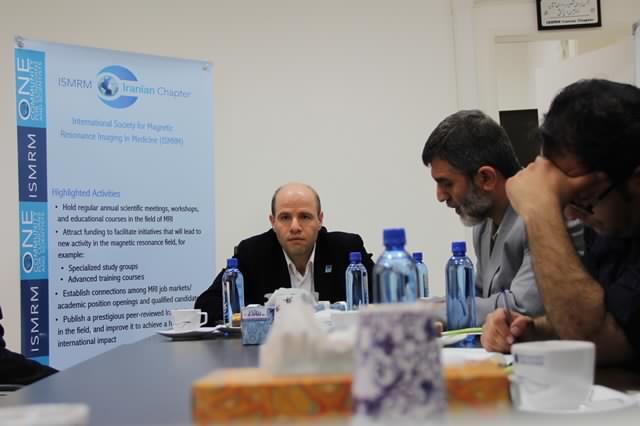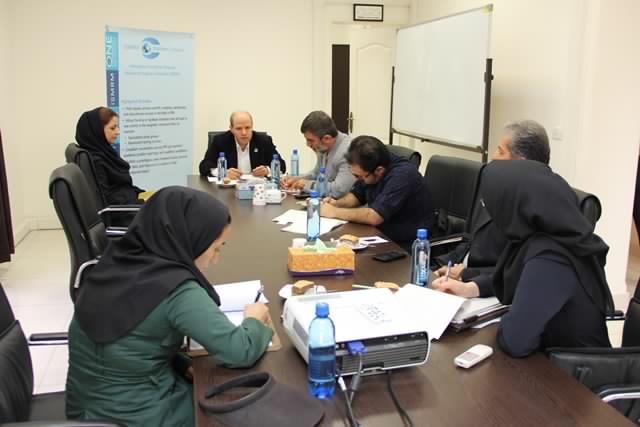|
Establishment of the Iranian Chapter of ISMRM


The Iranian Chapter of
the International Society for Magnetic Resonance in Medicine
(ISMRM) has been founded with the motto of “One Community
for Clinicians and Scientists”— said Hamidreza Saligheh Rad,
the chairman of the ISMRM Iranian Chapter, in a press
conference organized by public relations deputy of the
Office of Vice-Chancellor for Global Strategies and
International Affairs, Tehran University of Medical Sciences
on May 11, 2015.
Dr. Saligheh Rad said
that the mother ISMRM organization has initiated its
activities as a nonprofit international association in 1994,
when it held its first conference in Texas, trying to bring
the two communities of clinicians and engineers in the field
of MRI together. He mentioned that each year, ISMRM hosts
about 5 to 8 thousand MRI researchers and scientists from
multidisciplinary areas consisting of clinicians,
physicists, engineers, biochemists, and technologists from
all over the world, in its annual meeting and exhibition.
Saligheh Rad declared
that “Iranian MRI scientists, from international
institutions and universities, have pursued to submit a
petition for the formation of an Iranian Chapter since 2011
and as of July 2014, Iran was granted the approval for
becoming an official ISMRM chapter. The Iranian Chapter of
ISMRM is established to fulfill the clinical needs, to
develop technological solutions to the clinical problems,
and to attract members from different related fields
including radiology, neurosurgery, biology, physiology,
engineering, medicine and chemistry. The main objectives of
this organization is to bridge the needs of the two
communities of MRI scientists and clinicians, encourage
research and development in basic science and medical
applications, create forums to upgrade the knowledge of MR
imaging in medicine and biology, promote communication and
mutual understanding of the parties involved in MR imaging
clinics and development, provide high quality education and
training in the field, and ultimately improve the healthcare
outcome throughout the country.”
The chairman of ISMRM
Iranian Chapter emphasized that this organization will
strive to encourage the MR imaging centers and professionals
to utilize the expensive MRI technology with accuracy and
efficiency in diagnosis and management of diseases, for
which he believes that high quality education in the field
of MRI is crucial. He added: “Prior to any investment on new
equipments in the field of MR medical imaging, research and
education should be considered for all. To achieve this
goal, we invite scholars and experts from all national
universities, research and imaging centers, pharmaceutical
and medical equipment companies, etc to cooperate with and
to support the chapter.”
According to Saligheh
Rad, there are around 130 MRI scanners with advanced
features in Iran, but most of them are not being used
efficiently. Therefore, structured training for clinicians
and clinical scientists is an essential step in exploiting
these devices effectively. He further described the
functions of the ISMRM Iranian Chapter: “The chapter will
operate to discover potential talents through holding
seminars, scientific workshops, annual meetings, communicate
effectively with professionals in the areas of medical and
basic sciences, provide a complete list of job opportunities
in the field of MRI, encourage and financially support
talented students, researchers, and scientists who has no
research support to participate in national and
international seminars, and finally create a platform for
public training for all students and researchers in the
field.”
Dr. Saligheh Rad
claimed that for initiating international collaborations,
they are considering to plan regional and international
workshops, and inviting influential people in research and
development of modern MRI techniques starting from the
Middle East and Asia region. He said that interacting with
national institutions and organizations will illuminate
paths towards achieving the ultimate goals of the Iranian
chapter. He concluded: “So far, the Office of International
Affairs of Tehran University of Medical Sciences has
supported us, and in our future scope, we will seek to
communicate with other organizations as well for their
support.” |